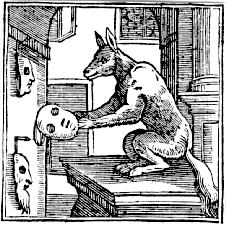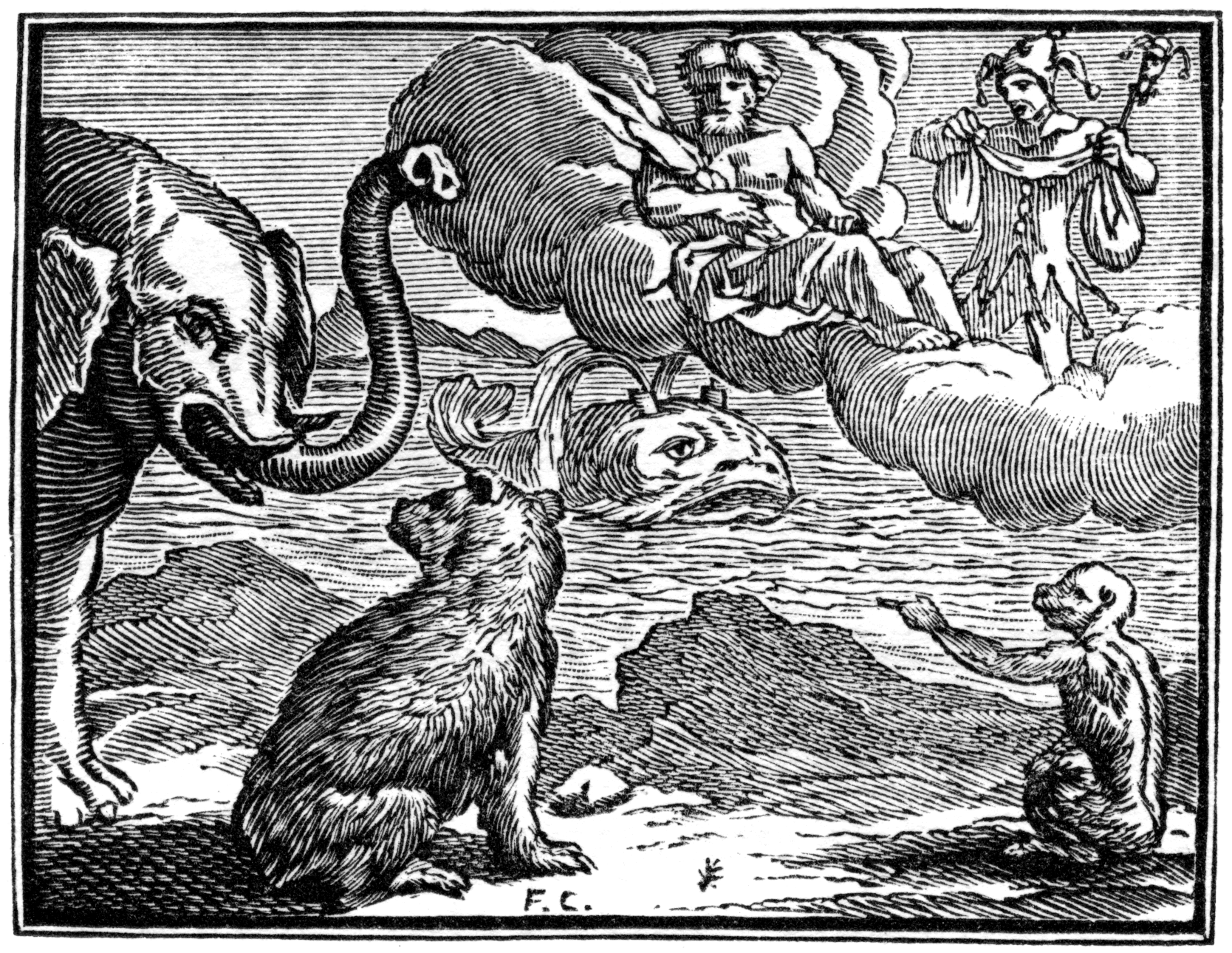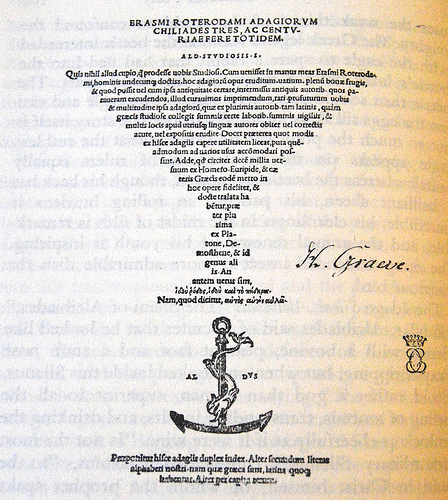|
The Eagle And The Beetle
The story of the feud between the eagle and the beetle is one of Aesop's Fables and often referred to in Classical times. It is numbered 3 in the Perry Index and the episode became proverbial. Although different in detail, it can be compared to the fable of The Eagle and the Fox. In both cases the eagle believes itself safe from retribution for an act of violence and is punished by the destruction of its young. The fable and its variations A hare that is fleeing from an eagle begs a beetle for shelter. The beetle pleads that the right of asylum is guaranteed by Zeus but the eagle, being the bird of Zeus, arrogantly disregards this and tears the hare to pieces. In revenge, the beetle climbs to the eagle's nest and rolls out its eggs, following it up the higher it builds. Finally the eagle lays its eggs in the lap of Zeus but the beetle flies about the god's head, or in some versions rolls a ball of dung onto him, causing the god to leap up and let the eggs fall to the ground. There ... [...More Info...] [...Related Items...] OR: [Wikipedia] [Google] [Baidu] |
Andrea Alciato
Andrea Alciato (8 May 149212 January 1550), commonly known as Alciati (Andreas Alciatus), was an Italian jurist and writer. He is regarded as the founder of the French school of legal humanists. Biography Alciati was born in Alzate Brianza, near Milan, and settled in France in the early 16th century. He displayed great literary skill in his exposition of the laws, and was one of the first to interpret the civil law by the history, languages and literature of antiquity, and to substitute original research for the servile interpretations of the glossators. He published many legal works, and some annotations on Tacitus and accumulated a sylloge of Roman inscriptions from Milan and its territories, as part of his preparation for his history of Milan, written in 1504–05. Among his several appointments, Alciati taught Law at the University of Bourges between 1529 and 1535. It was Guillaume Budé who encouraged the call to Bourges at the time. Pierre Bayle, in his General Dictiona ... [...More Info...] [...Related Items...] OR: [Wikipedia] [Google] [Baidu] |
Beastly Tales
''Beastly Tales'' is a 1991 collection of ten fables in poetry written by Vikram Seth (UK , also US ). Its full title is ''Beastly Tales from Here and There'' and, in the introduction, Seth states "the first two come from India, the next two from China, the next two from Greece, the next two from the Ukraine. The final two came directly to me from the Land of Gup". Seth's sense of humour is exemplified by his retelling of the well-known fable of The Hare and The Tortoise (p. 43). In his version the loser, being a celebrity, is feted and the winner ignored. Contents # ''The Crocodile and the Monkey'' # ''The Louse and the Mosquito'' # ''The Mouse and the Snake'' # ''The Rat and the Ox'' # ''The Eagle and the Beetle'' # ''The Hare and the Tortoise'' # ''The Cat and the Cock'' # ''The Goat and the Ram'' # ''The Frog and the Nightingale'' # ''The Elephant and the Tragopan'' Adaptions Poems from the book have been performed by Naseeruddin Shah, Ratna Pathak Ratna Pathak ... [...More Info...] [...Related Items...] OR: [Wikipedia] [Google] [Baidu] |
Vikram Seth
Vikram Seth (born 20 June 1952) is an Indian novelist and poet. He has written several novels and poetry books. He has won several awards such as Padma Shri, Sahitya Academy Award, Pravasi Bharatiya Samman, WH Smith Literary Award and Crossword Book Award. Seth's collections of poetry such as '' Mappings'' and ''Beastly Tales'' are notable contributions to the Indian English language poetry canon. Early life and education Seth was born on 20 June 1952 in Calcutta. His father, Prem Nath Seth, was an executive of Bata Shoes and his mother, Leila Seth, a barrister by training, became the first female judge of the Delhi High Court and first woman to become Chief Justice of a state High Court in India. Seth was educated at the all-boys' private boarding school The Doon School in Dehradun, where he was editor-in-chief of '' The Doon School Weekly''. At Doon, he was influenced by his teacher, the mountaineer Gurdial Singh, who taught him geography and, according to Leila Seth, "gu ... [...More Info...] [...Related Items...] OR: [Wikipedia] [Google] [Baidu] |
Robert Dodsley
Robert Dodsley (13 February 1703 – 23 September 1764) was an English bookseller, publisher, poet, playwright, and miscellaneous writer. Life Dodsley was born near Mansfield, Nottinghamshire, where his father was master of the free school. He is said to have been apprenticed to a stocking-weaver in Mansfield, from whom he ran away, going into service as a footman. Profits and fame from his early literary works enabled Dodsley to establish himself with the help of his friends (Alexander Pope lent him £100) as a bookseller at the sign of Tully's Head in Pall Mall, London, in 1735. He soon became one of the foremost publishers of the day. One of his first publications was Samuel Johnson's ''London'' for which he paid ten guineas in 1738. He published many of Johnson's works, and he suggested and helped to finance Johnson's ''Dictionary''. Pope also made over to Dodsley his interest in his letters. In 1738, the publication of Paul Whitehead's ''Manners'' was voted scandalous by th ... [...More Info...] [...Related Items...] OR: [Wikipedia] [Google] [Baidu] |
Hibernating
Hibernation is a state of minimal activity and metabolic depression undergone by some animal species. Hibernation is a seasonal heterothermy characterized by low body-temperature, slow breathing and heart-rate, and low metabolic rate. It most commonly occurs during winter months. Although traditionally reserved for "deep" hibernators such as rodents, the term has been redefined to include animals such as bears and is now applied based on active metabolic suppression rather than any absolute decline in body temperature. Many experts believe that the processes of daily torpor and hibernation form a continuum and utilise similar mechanisms. The equivalent during the summer months is aestivation. Hibernation functions to conserve energy when sufficient food is not available. To achieve this energy saving, an endothermic animal decreases its metabolic rate and thereby its body temperature. Hibernation may last days, weeks, or months—depending on the species, ambient temperature, ... [...More Info...] [...Related Items...] OR: [Wikipedia] [Google] [Baidu] |
La Fontaine's Fables
Jean de La Fontaine collected fables from a wide variety of sources, both Western and Eastern, and adapted them into French free verse. They were issued under the general title of Fables in several volumes from 1668 to 1694 and are considered classics of French literature. Humorous, nuanced and ironical, they were originally aimed at adults but then entered the educational system and were required learning for school children. Composition history Divided into 12 books, there are 239 of the ''Fables'', varying in length from a few lines to some hundred, those written later being as a rule longer than those written earlier. The first collection of ''Fables Choisies'' had appeared March 31, 1668, dividing 124 fables into six books over its two volumes. They were dedicated to ''"Monseigneur"'' Louis, ''le Grand Dauphin'', the six-year-old son of Louis XIV of France and his queen consort Maria Theresa of Spain. By this time, La Fontaine was 47 and known to readers chiefly as the aut ... [...More Info...] [...Related Items...] OR: [Wikipedia] [Google] [Baidu] |
Hieronymus Osius
Hieronymus Osius was a German Neo-Latin poet and academic about whom there are few biographical details. He was born about 1530 in Schlotheim and murdered in 1575 in Graz. After studying first at the university of Erfurt, he gained his master's degree from Wittenberg university in 1552 and later lectured on Poetics in the Philosophical faculty there. In 1558 he was crowned poet laureate in Copenhagen by King Christian III of Denmark. Thereafter he held teaching positions in Jena, Regensburg and Graz, identifying with Protestantism in the religious conflicts of the time. Osius was known as a pre-eminent poet whose works were frequently reprinted. They included his "Song on Christ’s Birth" (''Carmen de natali Christi'', 1557); an adaptation into Latin of the Homeric comic epic, the Batrachomyomachia (''Pugna ranarum et murium'', the battle of the frogs and mice); an epic of the Dithmarschen Peasants’ War (''Historia belli Ditmarsici'', 1560), which had only recently concluded an ... [...More Info...] [...Related Items...] OR: [Wikipedia] [Google] [Baidu] |
Adagia
''Adagia'' (singular ''adagium'') is the title of an annotated collection of Greek and Latin proverbs, compiled during the Renaissance by Dutch humanist Desiderius Erasmus Roterodamus. Erasmus' collection of proverbs is "one of the most monumental ... ever assembled" (Speroni, 1964, p. 1). The first edition, titled ''Collectanea Adagiorum'', was published in Paris in 1500, in a slim quarto of around eight hundred entries. By 1508, after his stay in Italy, Erasmus had expanded the collection (now called ''Adagiorum chiliades tres'' or "Three thousands of proverbs") to over 3,000 items, many accompanied by richly annotated commentaries, some of which were brief essays on political and moral topics. The work continued to expand right up to the author's death in 1536 (to a final total of 4,151 entries), confirming the fruit of Erasmus' vast reading in ancient literature. Commonplace examples from ''Adagia'' Some of the adages have become commonplace in many European language ... [...More Info...] [...Related Items...] OR: [Wikipedia] [Google] [Baidu] |
Aesop's Fables
Aesop's Fables, or the Aesopica, is a collection of fables credited to Aesop, a slave and storyteller believed to have lived in ancient Greece between 620 and 564 BCE. Of diverse origins, the stories associated with his name have descended to modern times through a number of sources and continue to be reinterpreted in different verbal registers and in popular as well as artistic media. The fables originally belonged to oral tradition and were not collected for some three centuries after Aesop's death. By that time, a variety of other stories, jokes and proverbs were being ascribed to him, although some of that material was from sources earlier than him or came from beyond the Greek cultural sphere. The process of inclusion has continued until the present, with some of the fables unrecorded before the Late Middle Ages and others arriving from outside Europe. The process is continuous and new stories are still being added to the Aesop corpus, even when they are demonstrably more ... [...More Info...] [...Related Items...] OR: [Wikipedia] [Google] [Baidu] |
Erasmus
Desiderius Erasmus Roterodamus (; ; English: Erasmus of Rotterdam or Erasmus;''Erasmus'' was his baptismal name, given after St. Erasmus of Formiae. ''Desiderius'' was an adopted additional name, which he used from 1496. The ''Roterodamus'' was a scholarly name meaning "from Rotterdam", though the Latin genitive would be . 28 October 1466 – 12 July 1536) was a Dutch philosopher and Catholic theologian who is considered one of the greatest scholars of the northern Renaissance.Gleason, John B. "The Birth Dates of John Colet and Erasmus of Rotterdam: Fresh Documentary Evidence", Renaissance Quarterly, The University of Chicago Press on behalf of the Renaissance Society of America, Vol. 32, No. 1 (Spring, 1979), pp. 73–76www.jstor.org/ref> As a Catholic priest, he was an important figure in classical scholarship who wrote in a pure Latin style. Among humanists he was given the sobriquet "Prince of the Humanists", and has been called "the crowning glory of the Christian humanists ... [...More Info...] [...Related Items...] OR: [Wikipedia] [Google] [Baidu] |






_-_Foto_G._Dall'Orto_5_ago_2006.jpg)
.jpg)